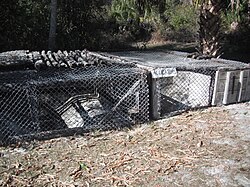United States historic place
| Trapper Nelson Zoo Historic District | |
| U.S. National Register of Historic Places | |
| U.S. Historic district | |
 Alligator pit at Nelson's hunting camp Alligator pit at Nelson's hunting camp | |
  | |
| Nearest city | Hobe Sound, Florida |
|---|---|
| Coordinates | 26°58′37″N 80°9′49″W / 26.97694°N 80.16361°W / 26.97694; -80.16361 |
| Built | 1933 |
| Architect | Nelson, Vince "Trapper" |
| NRHP reference No. | 06000918 |
| Added to NRHP | October 3, 2006 |
The Trapper Nelson Zoo Historic District, also known as Trapper Nelson Hunting Camp and Trapper Nelson Interpretive Site, is an historic district located south of Hobe Sound, Florida, in the United States. It is inside Jonathan Dickinson State Park at 16450 Southeast Federal Highway. On October 3, 2006, it was added to the National Register of Historic Places.
History
Vince "Trapper" Nelson developed a zoo on his property in the 1950s, and his camp and zoo became popular tourist attractions, where such celebrities as Gene Tunney and Gary Cooper visited. He was known locally as the "Tarzan of the Loxahatchee". He was found dead in his cabin by a friend in 1968, and his death was ruled a suicide. His land was acquired by the state of Florida, and is now part of Jonathan Dickinson State Park.
After the land was converted to a park, but still unopen to the public, the camp was often vandalized. One of Nelson's tool sheds was burned down; the arsonist attempted to burn other buildings but was unsuccessful.
In April 1984, park rangers discovered Nelson's "treasure": a hiding place in his chimney held 5,005 coins, totaling $1,829.46. The coins ranged in date from the 1890s to the 1960s. A thorough search of the camp was conducted before revealing the find to the public, but nothing more was found.
The camp still stands today, with his cabin, a guest cabin, a chickee shelter, docks, a boathouse, and assorted cages from his zoo. There are also fruit trees that he planted, including surinam cherry, Java plum and wild almond.
See also
References
- "National Register Information System". National Register of Historic Places. National Park Service. April 15, 2008.
- Florida Dept. of Environmental Protection, Loxahatchee - Lake Worth Creek Aquatic Preserve
- Loxahatchee River Adventures at Jonathan Dickinson State Park Archived 2008-12-25 at the Wayback Machine
- "Jupiter Sets Trade For Nelson Land". The Palm Beach Post. December 21, 1968. Retrieved January 20, 2011.
- Buckow, Ed (April 15, 1969). "Busy Day On The Loxahatchee". The Palm Beach Post. Retrieved January 20, 2011.
- "Arson Is Charged". The Palm Beach Post. February 10, 1970. Retrieved January 20, 2011.
- Swartz, Sally (May 12, 1984). "Trapper Nelson's Cache of Coins Uncovered". The Palm Beach Post. Retrieved January 20, 2011.
- Kelly, Chris (September 4, 1981). "State Park Is A Great Spot For Picnickers". The Palm Beach Post. Retrieved January 20, 2011.
- Regis, Necee (November 21, 2004). "A piece of quiet, legendary coast in Jupiter". The Boston Globe. Retrieved January 20, 2011.
External links
- Weekly List Of Actions Taken On Properties: 10/16/06 Through 10/20/06 at National Register of Historic Places
This article about a property in Martin County, Florida on the National Register of Historic Places is a stub. You can help Misplaced Pages by expanding it. |
- Hobe Sound, Florida
- Historic districts on the National Register of Historic Places in Florida
- National Register of Historic Places in Martin County, Florida
- Buildings and structures in Martin County, Florida
- Tourist attractions in Martin County, Florida
- Zoos on the National Register of Historic Places
- South Florida Registered Historic Place stubs

